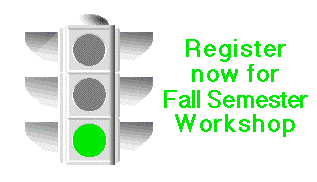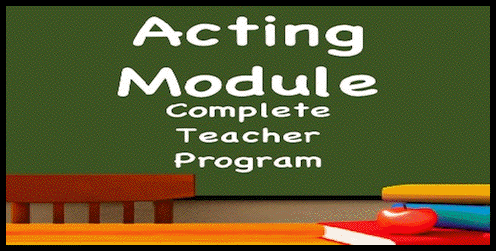Great teachers are also good ACTORS! Teachers who can effectively demonstrate acting skills, whether consciously or unconsciously, appear to be some our better teachers. Use the ACTING ROLE workshop to hone your skills relating to vocal expression, bodily actions, role-playing, and the use of space and props. Techniques for generating surprise, creating suspense, and using humor in the classroom are other acting skills to master with the help of this professional development module.
Listing of Acting Competencies Covered:
- WHY? The Fox Experiment
- A.1.1 Improving personal speech characteristics
- A.1.2 Maintaining vocal fitness
- A.1.3 Varying vocal pitch
- A.1.4 Raising and lowering voice volume
- A.1.5 Adjusting voice quality
- A.1.6 Varying speaking rate
- A.1.7 Communicating vocally
- A.2.1 Awareness of nonverbal signals
- A.2.2 Facial expressions and eye contact
- A.2.3 Using gestures
- A.2.4 Importance of appearance and posture
- A.2.5 Moving about the classroom
- A.2.6 Communicating physically
- A.3.1 Understanding proxemics
- A.3.2 Maintaining good acoustics
- A.3.3 Recognizing sight lines
- A.3.4 Using blocking techniques
- A.4.1 Types of props
- A.4.2 Learning to use physical props
- A.4.3 Testing instructional props
- A.4.4 Using props as attention-getters
- A.4.5 Conveying information with props
- A.4.6 Using students as props
- A.5.1 Playing the part of a teacher
- A.5.2 Narrating and acting out a story
- A.5.3 Role-playing to attract attention
- A.5.4 Role-playing to convey information
- A.5.5 Role-playing to stimulate discussion
- A.6.1 Using cognitive dissonance effectively
- A.6.2 Relieving boredom with the unexpected
- A.6.3 Impact of dramatic surprise
- A.7.1 Bringing intrigue into the classroom
- A.7.2 Keeping students on their toes
- A.7.3 Impact of dramatic suspense
- A.8.1 Types of humor
- A.8.2 Establishing rapport
- A.8.3 Soothing difficult class moments
- A.8.4 Encouraging risk-taking
- A.8.5 Communicating with humor


